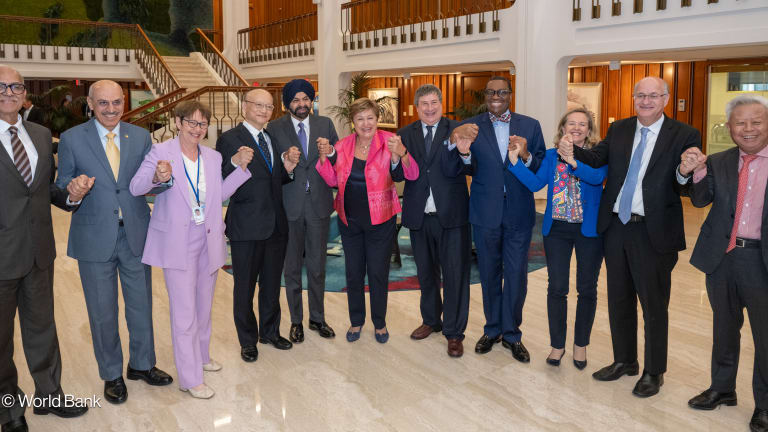
The world of development cooperation is prone to fads and ideologies that sweep through the sector and can leave confusion and destruction in their wake. At one time, it was all about budget support; at another it was all about “recipient-driven aid.”
One of the most tenacious fads, prevalent around the turn of the millennium, was an obsession with good governance. The theory ran that offering development assistance to countries prone to corruption, undemocratic practices, dominant elites, or weak institutions made no sense. Instead that assistance should be poured into improving governance so that development assistance might achieve a more lasting impact. There is some logic behind this argument, but it was taken to extremes and tended to trip up on the obstacles of improving governance standards in reality.
While the debate was raging, Harvard University’s Merilee Grindle produced a report for the World Bank in 2002 titled Good Enough Governance. Certainly assisting countries that were at the bottom of the governance pile (such as Robert Mugabe’s Zimbabwe) was probably not an effective use of limited aid resources. However, the report suggested that once countries achieve a certain threshold of decent governance practices, other priorities — such as mother and child care, health, education, and infrastructure development — become more urgent and justifiable than continuing to pour money into capacity building or strengthening democratic institutions.
Grindle’s insight led to a repositioning of good governance within a broader frame of development priorities. Fifteen years after publication, it is clear that the “good enough” concept applies not just to governance, and not just to development fads; its application is much more general.
Today, the world of development has reconfigured around the Sustainable Development Goals like iron filings around a magnet. Governments, academics, civil society organizations, and businesses are lining up to swear allegiance to the SDGs. And in the process, we are ignoring the central message of what is, after all, intended to be a transformative agenda; namely that we will succeed only if we think and act differently from the way we have in our past insufficient efforts to achieve sustainability. We need to find the right balance of attention to the different components of the change spectrum — from science and knowledge, through policy and politics, to action and impact.
Yet anyone grappling with the SDG challenge will quickly note the concentration of effort at the science and knowledge end of the spectrum. True to form, we are busy formulating plans, strategies, roadmaps, and action plans. The academic community is holding seminars and workshops, staging lectures, and adding SDG content to their courses. Researchers are researching, planners are planning, teachers are teaching, the indicators community is refining the indicators, the monitoring people are measuring. There is a heavy focus on the front-end of the continuum that leads to action. We are all acting our parts, playing our roles. As Avram Lazar, a world renowned policy and communications consultant, once said: “if your only tool is a hammer, everything begins to look like a nail.” The sound of hammering is deafening.
But the value of the SDGs and the targets lies in their actual achievement — in bringing about the transformative change that achieving them would generate. The SDGs are not perfect, but they benefit from the legitimacy derived from the highly inclusive, bottom-up process through which they were articulated and set. If genuinely implemented, the world would be a significantly better place. They are, to borrow from Grindle, “good enough goals.” Let’s accept them and devote our efforts to achieving them in reality.
While the foundation of science and knowledge underlying the SDGs is incomplete, the knowledge base is more than adequate to serve the needs of implementation. Instead of completing and refining that base, we should be working on removing the obstacles to implementation. We have “good enough science” and “good enough knowledge.”
What is missing is a genuine focus on why knowledge and science are not translating into action at a pace and scale likely to deliver the SDGs by 2030. To work this out requires a significant shift. It requires the abandonment of a number of the false assumptions that still underlie much of what we do.
The first is that action is not taking place because we don’t yet adequately understand the problem. Nonsense. Our understanding is good enough to move now to action.
The second is that we are not acting because we are not yet sure what we should do. Rubbish. Our shelves are creaking under the weight of sectoral, national, and local action plans, strategies, and roadmaps. Our priority-setting is good enough.
If we can accept that both knowledge and priority setting are adequate, the bulk of our energy, resources, and brainpower should be invested in breaking down the obstacles to implementation, to innovation and experimentation, and to working out new configurations of actors and new ways of acting — through purpose-built coalitions, through networks, through social mobilization, through entrepreneurship, and through innovative applications of technology.
Transformation will not come from doing more of what we did before. If the traditional players cannot do the job, we need to find new ones and empower them to act.
The SDGs may represent our last chance to transition to a world characterized by justice, opportunity, peace, and stability. We must do everything possible not to miss this chance. That means accepting that the stage settings are good enough, and getting on with the play. Whether or not it turns out to be a tragedy is up to us.
Devex is on the ground in New York at Global Goals Week, bringing you daily morning briefings with everything you need to know — whether you're here in person or following the events from afar. Sign up for our daily briefings.
Read more on Global Goals Week:
▶ Bill Gates says progress on the SDGs is possible but not inevitable
▶ Top 3 development takeaways from Trump's UN address
▶ Amid global crises, UNGA will show development community rising to the challenges
Sign up for our Global Goals Week daily briefings and visit our Global Goal Week site for full coverage








